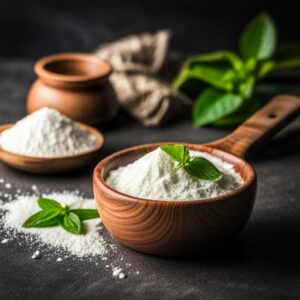Consumer Perception and Usage: Evaluating How Consumers Perceive Stevia Compared to Other Sweeteners
In the modern health-conscious world, consumers are constantly seeking healthier alternatives to sugar. Among the numerous options available, stevia has gained significant attention. But how do consumers perceive stevia compared to other sweeteners like aspartame, sucralose, and traditional sugar? This article delves into consumer perceptions, focusing on taste, health consciousness, and overall satisfaction.
The Rise of Sweeteners
The evolution of sweeteners has been driven primarily by health concerns. Sugar, though widely loved for its taste, has been linked to numerous health issues such as obesity, diabetes, and heart disease. As a result, many consumers have turned to alternatives like artificial sweeteners and natural substitutes, with stevia emerging as a popular choice.
Stevia: A Natural Sweetener
Stevia, derived from the leaves of the Stevia rebaudiana plant, is a natural, zero-calorie sweetener. It’s known for being significantly sweeter than sugar, which means only a small amount is needed. Consumers who favor natural products often perceive stevia as a healthier alternative to artificial sweeteners and sugar.
 Consumer Perception of Taste
Consumer Perception of Taste
Stevia vs. Sugar
When it comes to taste, stevia presents a mixed bag. Many consumers appreciate its natural origin, but its distinct aftertaste can be a point of contention. Unlike sugar, which offers a familiar and universally accepted sweetness, stevia has a unique taste that may require some adjustment. Despite this, consumers who seek to reduce sugar intake often find the taste difference acceptable, especially after they become accustomed to it.
Stevia vs. Artificial Sweeteners
Compared to artificial sweeteners like aspartame and sucralose, stevia generally enjoys a better reputation due to its natural origins. Many consumers report that stevia’s taste is preferable to the somewhat chemical taste of artificial sweeteners. However, the perception of taste can vary significantly. Some consumers might prefer the familiarity of artificial sweeteners over the slightly herbal aftertaste of stevia.
Health Consciousness
The Natural Appeal of Stevia
One factor strongly influencing consumer perception is health consciousness. Consumers increasingly prioritize natural and minimally processed foods. Seeing “organic” or “natural” labels heavily influences their purchasing decisions. Stevia’s natural origin gives it an edge over artificial sweeteners in the eyes of health-conscious consumers. They often perceive stevia as a healthier, less harmful option, despite mixed scientific evidence regarding the health impacts of various sweeteners.
Comparisons with Artificial Sweeteners
Artificial sweeteners, despite being calorie-free, often face skepticism due to concerns over potential long-term health effects. Studies have debated their safety and impact, with some suggesting links to negative health outcomes. This has led health-conscious consumers to favor natural alternatives like stevia, despite similar debates over its impacts. The perception that “natural” equates to “healthier” heavily influences consumer preference for stevia.
Long-term Side Effects of Artificial Sweeteners
Aspartame
Aspartame has been a subject of extensive research and debate since its introduction. While deemed safe by major health organizations such as the FDA, EFSA, and WHO, concerns about its long-term effects persist. Studies have suggested potential links between aspartame consumption and various health issues, including headaches, dizziness, and mood changes. Some research also points to more severe concerns, such as an increased risk of certain cancers, neurological issues, and metabolic disorders. Critics argue that more comprehensive long-term studies are needed to fully understand the potential risks associated with prolonged aspartame consumption.
Sucralose
Sucralose, another popular artificial sweetener, is also under scrutiny for its long-term health impacts. Though generally considered safe by regulatory authorities, some studies have raised concerns about its effects on the gut microbiome. This disruption of gut flora can potentially lead to digestive issues and impact overall health. Additionally, there are indications that sucralose may affect insulin response and blood sugar levels, which could have implications for individuals with diabetes or metabolic syndrome. As with aspartame, further long-term studies are necessary to confirm these findings and provide clearer guidance on the safe consumption of sucralose.
Overall Satisfaction
Stevia’s Versatility and Convenience
Stevia’s increasing availability in various forms—liquid drops, powders, and blends—adds to its appeal. Consumers find it convenient for a range of uses, from sweetening beverages to baking. The versatility and zero-calorie profile contribute to high satisfaction levels, particularly among those managing calorie intake or blood sugar levels.
Stevia in Popular Products
The inclusion of stevia in numerous food and beverage products has also enhanced its visibility and acceptance. Its use in products marketed as “healthy” or “low-calorie” aligns with the growing demand for better-for-you options. The enhancement of product taste and health profile with stevia boosts overall consumer satisfaction.
Challenges and Barriers
Taste and Perception Adjustments
Despite its many advantages, stevia does face challenges, primarily related to its taste. The distinctive aftertaste, described as licorice-like by some, requires consumers to adjust their flavor expectations. This taste difference can be a barrier for some, particularly those accustomed to the taste of sugar or artificial sweeteners.
Misinformation and Awareness
Another barrier to stevia’s widespread acceptance is misinformation and lack of awareness. Consumers need more education on the benefits and potential drawbacks of stevia compared to other sweeteners. Clear and accurate information can help consumers make informed choices based on their health needs and taste preferences.
The Future of Stevia and Sweeteners
Innovations and Product Development
The sweetener industry continues to innovate, creating new formulations to address taste and satisfaction concerns. Stevia is often blended with other sweeteners to enhance taste and reduce aftertaste. Such innovations are crucial for increasing consumer acceptance and satisfaction.
Increasing Health Trends
As health trends continue to steer consumers toward natural and low-calorie options, the demand for stevia is likely to grow. With ongoing research and development, stevia products will likely become more palatable, further enhancing consumer acceptance.
Educating Consumers
Educating consumers about the differences between sweeteners and their respective health impacts remains a priority. Transparent information and research-backed claims can demystify choices, helping consumers confidently opt for sweeteners that align with their health goals and taste preferences.
 Choose Natural Sweeteners
Choose Natural Sweeteners
Consumer perception of stevia compared to other sweeteners is shaped by multifaceted factors, including taste, health consciousness, and overall satisfaction. Stevia’s natural origin and zero-calorie appeal make it a favored choice for many health-conscious consumers, despite some taste-related barriers. As the market for healthier alternatives continues to expand, stevia’s role is poised to grow, provided that education, innovation, and transparency keep pace with consumer demands. This evolution in consumer preferences not only reflects broader health trends but also signifies a gradual shift towards natural and minimally processed choices, reshaping the landscape of sweetness in our diets.


 Consumer Perception of Taste
Consumer Perception of Taste
Leave a Reply